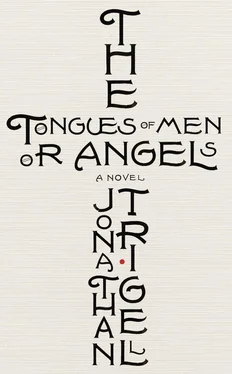‘Yes, the axe is at the root of the tree, where it’s been these thirty-odd years. But if you’ve changed the head with a new blade and changed the haft with a different handle, is it still the same axe? Perhaps it is no longer even an axe. Maybe you now hold a mattock or a hoe.’
‘Well, presently we’ll know. And if this is not yet the end of days, be content that your vision of The Way will be the victor, Peter. My stoutest supporters will try to continue, I don’t doubt it, but without me they can’t stand against the authority of James, the Lord’s brother.’
‘You don’t know, then?’ Cephas says, his voice in pebble waver. ‘I thought the whole world would have heard by now. James the Just is dead, Paul. James is dead.’
Thirty-two Years after the Crucifixion
Last night James stayed in Bethany. At the home of an enduring friend, the same house where his brother was once anointed with costly oil, as all kings must be. Thus James now descends the Mount of Olives as he walks to the Temple. It distils one’s mind, to pass through that place where so much happened. And so much did not happen. Where they prayed in the darkness for all that Zechariah had prophesized and promised. But the earthquakes didn’t come and the Romans did.
There is a leafy smell of plenty in the olive groves. A scent much missed in recent years. And everything cries of the Galilee Sea, strangely, because those Galilee days are far away in distance and time, but the wind rolls in James’s ears, the trees sway like the waves and it’s cool and fresh as the breeze on a boat.
Some of the trees are old as Methuselah, with trunks thicker than the backs of a plough-pulling brace of oxen. How would these ancient olive trees be with wild shoots grafted on to their roots? Would they thrive as they do now or would the struggle to combine kill both parts and whole? James knows the alluring maniac Paul has written that his Gentile communities are just so grafted on to the nourishing sap from the root of Israel, from which he says the Jews themselves are now snapped off. Who knows if Paul really believes such things? Paul’s lips drip honey and his speech is smoother than oil, but James is sure God loves His people. That is life’s one certainty. God covenanted this land to prove it. And presently Yeshua will return to free it.
James treads stiffly down the path towards the Kidron valley, winding between the coin-round rolling stones of the ossuary caves hollowed into the hillside. That was another certain truth: James was witness to the empty tomb; he and Cephas saw with their own eyes that Yeshua’s body was gone. There are Sadducees who say it wasn’t so, but they are flatly wrong.
From here, the Temple is barely as big as one of James’s dark thumbnails, but only as everything is decreased from a distance: nothing can negate the Temple’s importance; like a guardian, the Temple watches over Jerusalem. And the Roman Antonia Fortress watches over the Temple. Jerusalem’s walls of quarry-cut limestone, higher than the tallest trees, look impregnable, yet they have been pregnated: enemy seed lies within, multiplying. But shortly Yeshua will return to defeat all oppression and usher in the true Kingdom of God.
There have been other would-be messiahs, of course, during the period while James and those of The Way have patiently waited for Yeshua’s reappearance. Just a few years back there was the one they called the Egyptian, who was convinced that he could bring Judaea liberty and a new dawn. The Egyptian had gathered a multitude of common people right here on the Mount of Olives — from where the new age must indeed begin — saying he would collapse the fortifications of Jerusalem — perhaps he hoped for earthquakes. Then he and his believers would march through the tumbled defences and defeat the Romans and their collaborators. The prefect of the time, Felix, had unleashed a force that killed four hundred of the Egyptian’s followers and captured another two hundred alive, later all crucified.
Before the Egyptian, there was the man called Theudas. Roman horsemen had decapitated him and slaughtered many of his acolytes, without waiting to see if Theudas could indeed perform the miracles he claimed. Which, of course, he would not have done: Yeshua is the true anointed one, of the line of David, and any day now he will come back to prove it.

James prays in the Temple so frequently and for so long that his knees have grown swollen and calloused, like those of a camel. It pains them now to walk great distances; not that this is such a long way — the Kidron valley is not even wider than a dog’s bark, for dogs on one side can cause retaliation from the other — but the steep uphill from its bottom still takes its toll. James is past sixty years, a venerable enough age for any man to reach in these times, but he won’t be going anywhere until Yeshua returns. That much is sure.
James rests when he reaches the vast steps of the Temple, which lead to its double and triple gates. There’s a vagabond at the foot of them, with a grey-faced monkey in a little tunic. And when the man plays his reed pipes the monkey dances for him. A watching toddler flaps his arms and shrieks with joy that such a thing should be. Too young yet to know that in Jerusalem all things are.
When the Greek-Seleucid Empire outlawed and tried to extinguish the religion of the Israelites, women were thrown from this corner of the Temple Mount, for having their babies circumcised. And people who hid to observe the Sabbath were burned alive. Many were tortured and slaughtered for refusing to eat swine meat. These things that Saul of Tarsus would surrender are not convention or etiquette. They are the very essence of a nation. They are the people’s portion of the contract agreed with God.
As he approaches the leftmost gate, James hands a coin to a ragged and ancient crone who sits there, not seemingly begging but without other obvious pursuit. And she says she’ll give it to the poor ones, though the idea that there could be anyone poorer than her seems improbable. And then she says, ‘I met him, you know. I knew him, if only for a moment of a day. That day in the Temple. He was like the sky wrapped in a skin.’
And she looks as though she might be mad — she puts a hand over her mouth, as if to stop her speech, or else to hide it — but she speaks the truth, because who could she mean but Yeshua? And if that’s who she means, then it’s as good a description as any.
James passes through the gate and into the glorious colonnaded courtyard of the Temple, a space so huge that it occupies perhaps a tenth of the entire city. A feat of engineering near mystical. Mostly the pale stone is smooth as kidskin but here and there are blocks left irregular, just as they came. Parts a builder could have left aside, but which have become corner stones.
Everything is about stone in this land. Yeshua named a fisherman Cephas — Peter, in Greek — Rocky. Then he with James and Jochanan became the Three Pillars. And now James, already surnamed the Just, is also known as Oblias — Rampart of the People — not only a pillar, but a bulwark wall that protects them. James has risen in populist prominence to become almost a rival high priest. He wears the white linen robes and turban of a priest this very day. There are even rumours that James has entered the Holy of Holies, the innermost sanctum, where only the high priest is allowed. If James has really done so, it is blasphemy. But if he has done so and lived, it is a sign of confidence and power and of God’s favour.
Many among the Jerusalemites have long doubted the legitimacy of high priests chosen by Rome. James now speaks openly against the present incumbent: Annas the Younger; Annas son of Annas; offspring of the man who had a hand in Yeshua’s death.
Читать дальше













